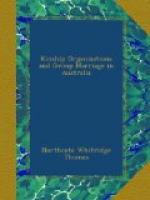Students of the sociology of white races enjoy conspicuous advantages over those who devote themselves to the investigation of the organisation of races in the lower stages of culture. In the first place they deal with conditions and forms with which they are personally familiar; and this familiarity is shared by those who form the audience, or the reading public, of these investigators, who may thus count on making themselves understood. Even should they find the already existing terminology insufficient, the knowledge of the phenomena enables them to introduce suitable modifications or innovations without fear of causing misunderstanding. It is true that terminology is often loose, but it exists and can be made to express what is meant.
The student of primitive sociology, on the other hand, is called upon to digest the reports of other observers, who have not always understood the conditions which they describe, who have failed to define to themselves what they are endeavouring to make clear to others, and who make use of a terminology created for an entirely different set of conditions, as if exact definition and care in the use of terms were the last and not the first duty of the observer when he frames his report.
Thus, to take a concrete example, there is not much danger that a writer who discusses the question of marriage in civilised communities will deal with one form of union of the sexes, while his readers may imagine that he is dealing with another form. For marriage is the form of sexual union recognised by the law of the land, and its legal sanction distinguishes it from all other forms of sexual union, however permanent they may be, and however short may be the period before the marriage is dissolved by an appeal to the courts of law. In fact in civilised communities the fulfilment of legal forms and ceremonies constitutes marriage, whatever might be said of a union sanctioned by legal forms but unaccompanied by the cohabitation of the parties. When, however, we are dealing with a people ruled by custom and not by law, the case is far different. The force of custom may and usually does in such cases far exceed the force of law in civilised communities. In the lower stages of culture there is far more reluctance to overstep the traditional lines of behaviour than is felt by the ordinary member of a European state, and this though there are penalties in the latter which do not necessarily exist in the former case. But law, in the sense of a rule of conduct, promulgated by a legislator and enforced by penalties inflicted by law courts and carried out by the agents of the state, does not necessarily exist, and, at most, exists only in a very inchoate state. If therefore we read of marriage among such a people, we are left in complete uncertainty whether it is a union corresponding to marriage in civilised lands, or whether it belongs to a different category. The difficulty of the case lies partly in the inability of the observer to




